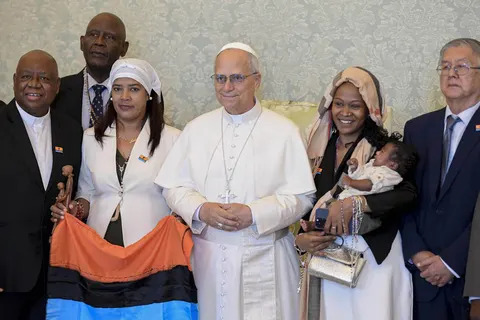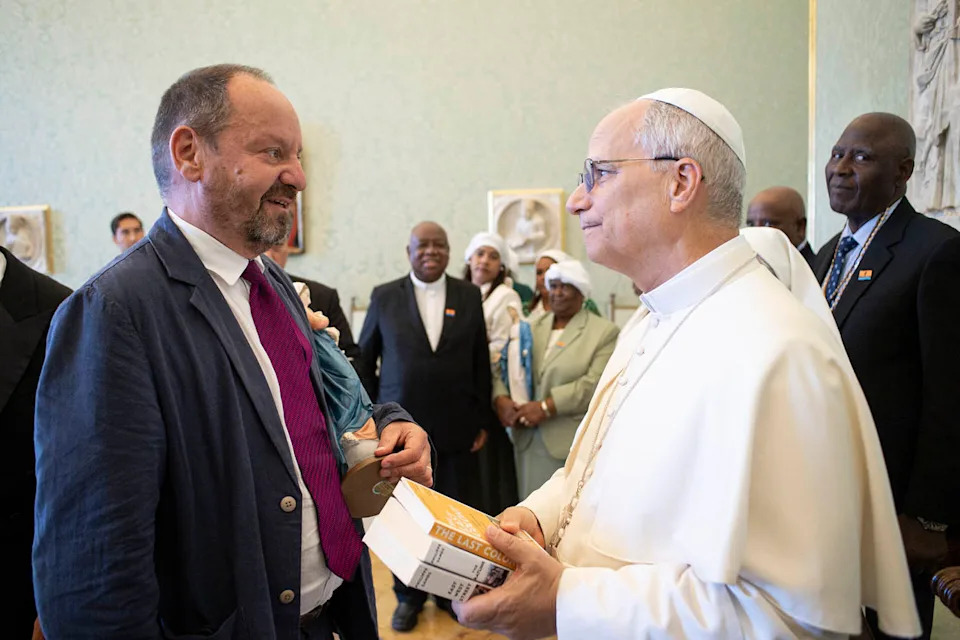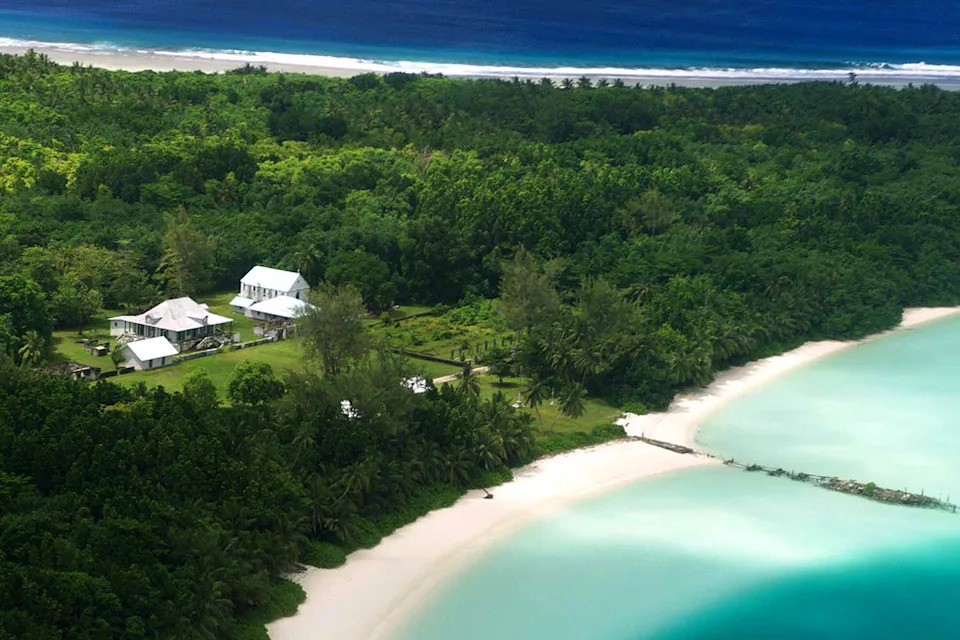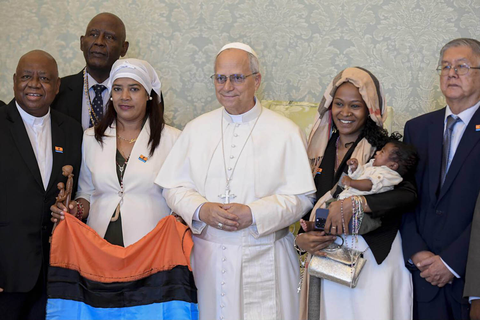
49930.jpeg None
“All peoples, even the smallest and weakest, must be respected by the powerful in their identity and their rights, in particular the right to live on their land; and no one can force them into exile.”
The words were spoken by Leo XIV on Saturday 23 August in the intimacy of the Vatican’s Hall of Popes. They were addressed to a delegation of Chagossians who had travelled from Mauritius and Britain to attend a personal audience with the pope, led by Olivier Bancoult, who heads the Chagos Refugee Group.
Bancoult is, by any reasonable standard, a remarkable individual. Born in 1964 on the minuscule island of Peros Banhos, he was banished into exile in 1968 – a four-year-old characterised, ludicrously, by Britain as a “contract labourer”. Over the next five years, the entire Chagossian population would be forcibly deported from the islands where they and generations of forebears were born,to make way for a US military base on Diego Garcia.
From the 1980s, Bancoult led a struggle to return, bringing a series of cases to the English courts, Bancoult Nos 1 to 5. He didn’t succeed, but the cases threw up a raft of archival documents, which I and my colleagues were able to use to good effect in taking Mauritius’s case to the International Court of Justice (ICJ). This was when I really came to know Olivier and his aunt Liseby Elysé, whose powerful testimony helped persuade the ICJ judges to rule in February 2019 that the Chagos Archipelago was a part of Mauritius: the “British Indian Ocean Territory” was unlawful, as was the deportation of the entire population.
In November 2022 treaty negotiations were initiated by Liz Truss, the then prime minister, and Pravind Jugnauth, her Mauritian counterpart. It was a rollercoaster process as governments changed in Britain, Mauritius and the US, but in May 2025 the two countries signed a treaty to give effect to the ICJ ruling. President Trump greenlit the deal, which recognises Mauritian sovereignty, allows the return of the Chagossians and the continued operation of the US base at Diego Garcia (with annual rent paid by British taxpayers, as British tabloids were quick to note) and provides for the protection of the area’s extraordinary and near-pristine marine environment.

Philippe Sands, who worked on the court case, was with the delegation that met the pope
Over the years, the Vatican and successive popes have consistently supported the Chagossians, who are ardent in their Roman Catholic faith, a legacy of French colonial rule. “I hoped for continuity with the new pope,” Bancoult told me, “so I requested a meeting with him.”
The bishop of Port Louis, in Mauritius, reached out to the Vatican, and a September date was set for the Chagossians to attend one of the pope’s general audiences, held every Wednesday for pilgrims and visitors. Then, out of the blue, Bancoult received word that the pope had invited them to a rare private audience – meetings usually reserved for government leaders, cardinals and other senior figures.
Bancoult pulled together a group at short notice: Chagossians (mainly women), a priest, a couple of lawyers and a long-time supporter. In Rome, the Chagossians lodged at the Congregation of the Sisters of Charity, an organisation closely associated with Mauritius.
Sister Dolores, born in Mauritius 90 years earlier, who first came to Rome in 1959, greeted me with a coffee. “What a day,” she said excitedly, but to my surprise told me she’d prefer not to join the group at the Vatican, where the audience was set for 12pm.
We took the subway to a shop near St Peter’s Square selling religious artefacts, to collect statues of Our Lady with Child. They were to be blessed by His Holiness and installed on Chagos. Though a secular Jew, my chance to have a blessed Madonna in my garden proved irresistible. “How is business?” I asked the owner. “Not so good,” he replied. “There used to be 300 new priests every year. Now it’s 50, so we sell far fewer cassocks.”
‘The group had a private moment alone with the pope, and what he said was politically important’
We passed through Vatican security and made our way to the entrance of the papal apartments in the Apostolic Palace. Sister Dolores greeted us with an impish grin. She just couldn’t resist, she said, as she charged nimbly up three flights of stairs; then a noble courtyard, into another entrance, then a lift, and finally a grand and marbled corridor where a Swiss Guard bedecked with medals directed us to the Hall of Popes.
On our way we passed through the Clementine Hall, where hundreds of Catholic legislators awaited their 11 o’clock audience. This was plainly a Law Day, as the pope would temper his concern about the state of the world – conflicts, shifting alliances and centre of gravity, and the “unprecedented influence of global corporations and technologies” – with words of hope for this audience, for “a world where power is tamed by conscience, and law is at the service of human dignity”.
In the Hall of Popes, we chatted, took selfies, clutched our statues and reined in the growing sense of eager anticipation. At 12 o’clock precisely the pontiff swept in, with a smile and a flourish, in glorious white. He took a seat centre stage, offered a prayer, and then addressed the group in fluent French, a language that respected the linguistic predispositions of his audience.
His words, spoken from a carefully prepared text, were thoughtful and far-reaching. Was I alone in being surprised? Occasionally, the pope looked towards Bancoult, seated in the front row, making eye contact as he expressed support for the late Pope Francis’s engagement, noting “the determination of the Chagossian people, and in particular that of the women, in peacefully asserting their rights”. He was conscious of their “years of exile” and the “poverty, contempt, and exclusion” with which they had lived.
The pope expressed delight at the signing of a treaty between Mauritius and Britain. It marked a significant victory for the Chagossian cause, and for “dialogue and respect for the decisions of international law”. It righted a grave injustice, he said, which was encouraging and internationally symbolic. He did not mention Ukraine or Palestine, but the reference to the right of a people to live on their land and not be exiled was clear ly understood. So were the words calling on the Mauritian authorities and the international community to make sure the Chagossians returned promptly and “in the best possible conditions”.
Exchanging words with each member of the delegation, he blessed the statues and accepted books. I thanked him for his commitment to the rule of law and, through him, those of Catholic faith who, many decades earlier, saved my mother from the Nazis. He came across as engaged and unburdened by self-importance, a quiet American, decent and humane, a most regular fellow. His delight at meeting Liseby, the star witness in the world court case, and the other Chagossians was palpable, an intimate and affecting encounter.

The Chagos Islands
After three-quarters of an hour, it was done. The pope departed; we were ushered out. Over lunch the Chagossians wanted fish and chips, as Sister Dolores puzzled over the menu and eventually chose a mozzarella and tomato salad (“We eat what we are given, and seldom eat in restaurants,” she explained).
We were joined by a seasoned Vatican observer, surprised by the fact of the private audience, its intimacy, the strength of the pope’s words and the fact that they were public. “One of the most pointed speeches of his young pontificate,” we were told. “The Chagossians had a private moment alone with the pope, and what he said was well-prepared and politically important.”
The Chagossians were elated, and I was surprised how affecting I found the morning. Bancoult’s daughter, Evelyna, who lives in Crawley in West Sussex, captured its significance. “The pope acknowledged our community, suffering and achievements, and gave us the strength to continue.” Liseby clutched her statue, hoping it would “soon be installed in the church in Peros Banhos”.
A few days later the Greek Orthodox and Latin Patriarchates of Jerusalem issued a joint statement on the Palestinians, picking up on Leo XIV’s message to the Chagossians, on the powerful and the weak, on land and exile. Words of support matter and over time they can make a real difference, especially when they emanate from a pope.
Philippe Sands KC is professor of law at UCL. He offered Pope Leo XIV copies of his books East West Street (2016), The Ratline (2020), and The Last Colony (2022). His latest book is 38 Londres Street (2025).
Photographs by Independent Photo Agency/Alamy Live News, From History/Universal Images Group via Getty Images
